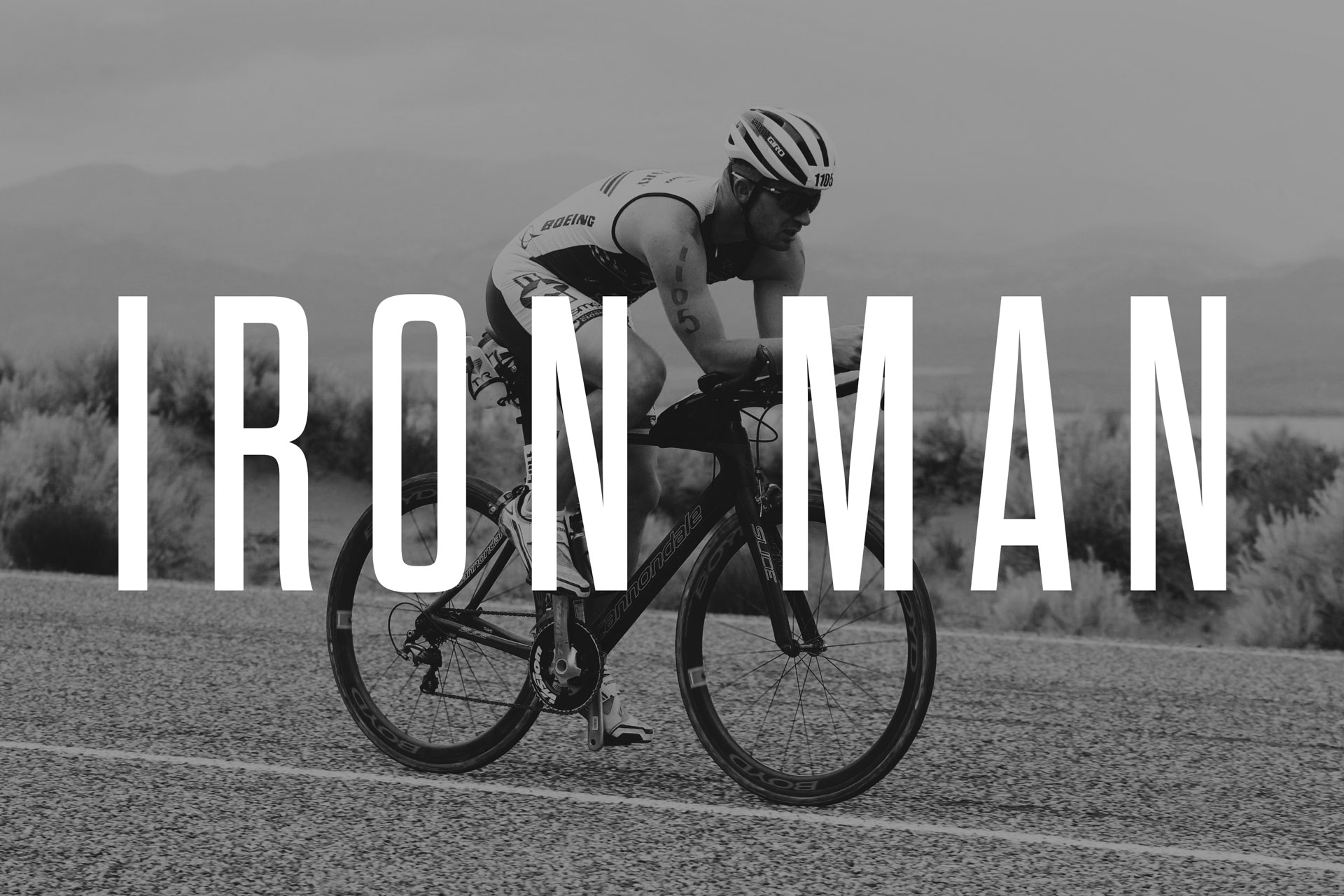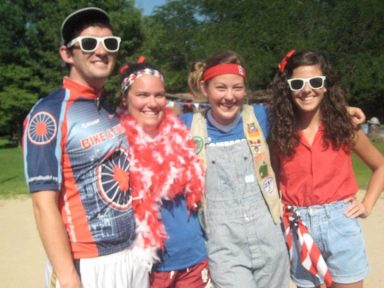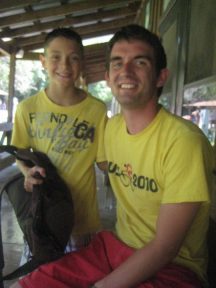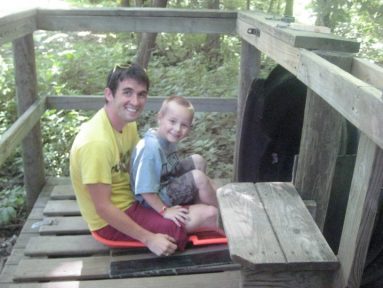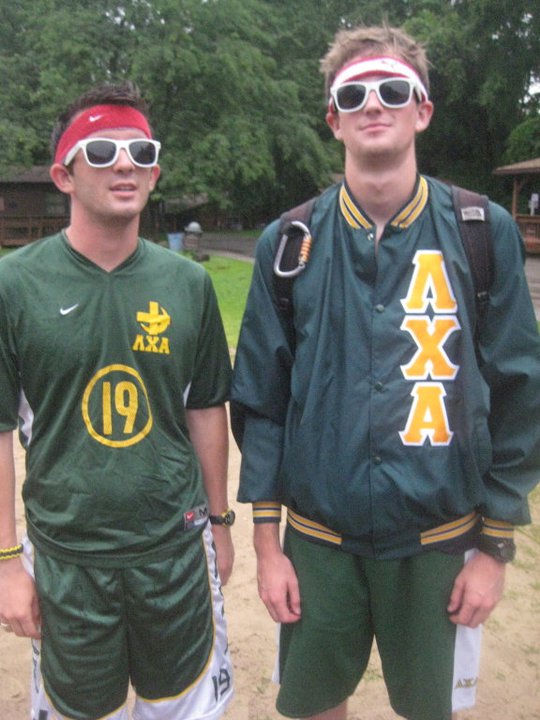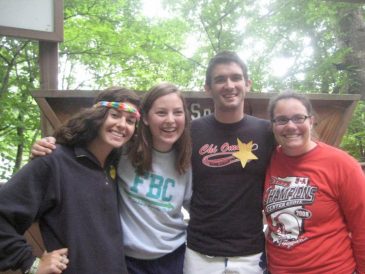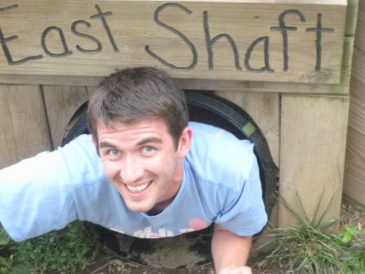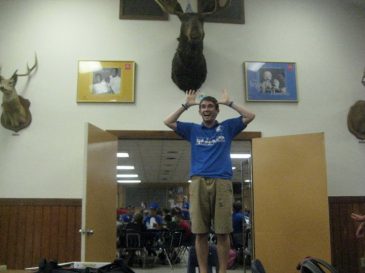Tecumseh Stories – Michael Kraft
A lifelong member of the Tecumseh family, few people have compiled as much Camp experience as Michael Kraft. Now an officer in the Air Force, Kraft has a new passion: competing in the Iron Man Triathalon. We chatted with Kraft to learn what it takes to compete in one of the world’s most demanding events.
CT: Krafty! Thanks so much for taking the time to chat. I know you’ve got a lot going on.
MK: You bet.
CT: To kick things off, can you tell me how you got started with Camp Tecumseh?
CT: Camp is so great. I started coming to family camp when I was a kid. My sisters came to Outdoor Education in 4th grade in 1991 I think. Then we all decided to come to summer camp. I started as an eight year old buck and worked my way up through the units. I got hired as a day camp counselor in high school and moved up early to overnight camp. From there I just worked forever.
CT: When you think back on all your years at Tecumseh, what moments really stand out?
MK: Coming back that last summer in 2011 and working with CILTS. I did it with Sarah Wright, who was a CILT with me, and Mel, and Arielle. There was such great camp culture. All my eight year olds were CILTS and I got to be a counselor to them again.
CT: After you graduated you ended up joining the Air Force.
MK: Yeah. I first went into teaching and there just wasn’t any money in it and there was so much going on politically. My sister had just joined the Coast Guard and she graduated from boot camp when I graduated from Purdue. I talked to her and mentioned the possibility of joining the Armed Forces. At first I thought I was going to be a pilot, but my elementary education degree didn’t qualify me for that job. I got another job in the Air Force instead. I moved to California in the spring, and I’ve been in Montana for four years now.
CT: Can you give us a description of what you’re doing now?
MK: Yep. I work with Intercontinental Ballistic Missiles (ICBMs). I work in the targeting shop.
CT: Running Triathlons is a pretty new thing for you. How did it start?
It all started one day when Seth Barry said, “Let’s go to the pool.” After I graduated from high school I lived with Seth Barry and I wasn’t in good shape. I decided to hire a trainer and started running all the time. Seth and I would run every day. Then I went on a bike and build trip over a summer. One day I came home and Seth was like, “Let’s go to the pool.” No Seth, I’m not going to the pool with you (Seth is a 5 time collegiate national championship swimmer). That day Seth swam like 4 miles, and I swam 4 laps. In the spring of 2011 we did the Carmel Triathlon. When I moved out to California triathlons were really popular. A lot of my new friends in Cali were running triathlons, doing longer courses and sprint olympics. In 2014 I decided I wanted to try the Iron Man. I never thought I would be capable until I started working my way up to it, and it all started because Seth invited me to the pool.
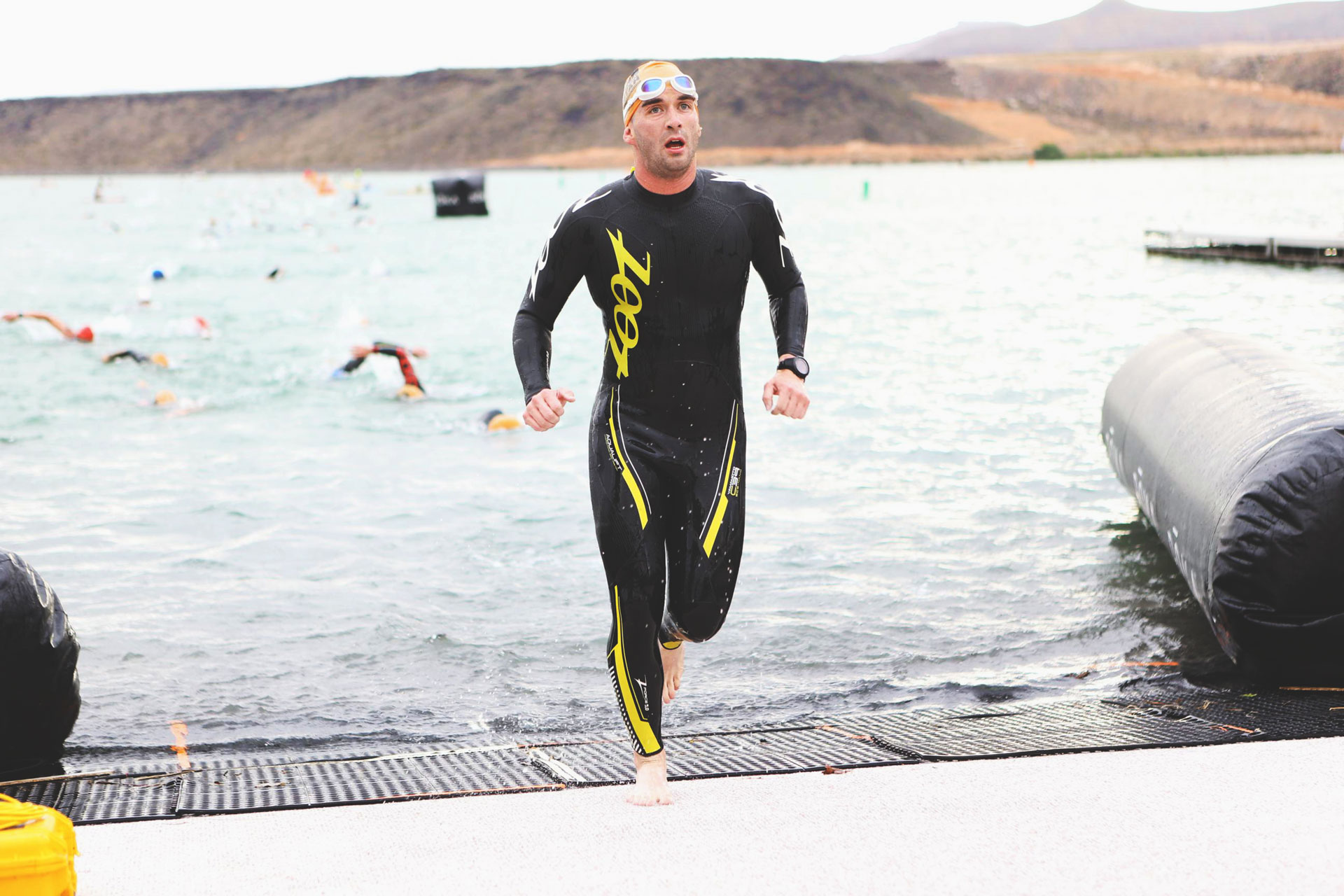
CT: Getting in shape for an Iron man has to be tough. How do you do it? What does preparation look like?
MK: I have a coach who controls the workout. I work out 6 or 7 days a week. Wednesday and Friday are swim days. I swim between an hour and an hour and 15 minutes. On Tuesday and Thursday I bike and immediately run after. Saturday is a long bike ride. Sunday is a long run. Monday is my recovery day. I’m not a morning person, and my coach knows that, so I work out in the evenings. I’d rather be in the gym at 9pm than 5am. It’s a very busy schedule and it’s all planned out.
CT: That’s a lot of work. I imagine your diet is just as strict?
MK: I’m really into this thing that we call soup. It’s just a turkey burger, as many veggies as we want, and a cup of soup.
CT: Do you listen to music while you’re competing or training? Audiobooks? Silence?
MK: I love techno pop and any music with a fast beat. I tried audiobooks but I got too bored. I like lots of music if I’m doing an indoor run. If I’m outdoors running the trails, I’ll leave my phone at home. Running outside is just so cool. Sometimes music ruins it.
CT: What motivates you to compete in the Iron Man? What do you get out of it?
MK: Racing is fun. I’m never going to win, and that’s kind of nice, because my competitive side can sometimes get the better of me. I know I’m competing with myself. I’m not trying to beat others or win. I’m just trying to hit my goals and have my best time. This keeps me sane. On top of that, it’s nice to have a coach and accountability. I like having somebody I can report to and have somebody who can give me feedback on what I can be doing better. I can always get better, and that’s what I really like about it.
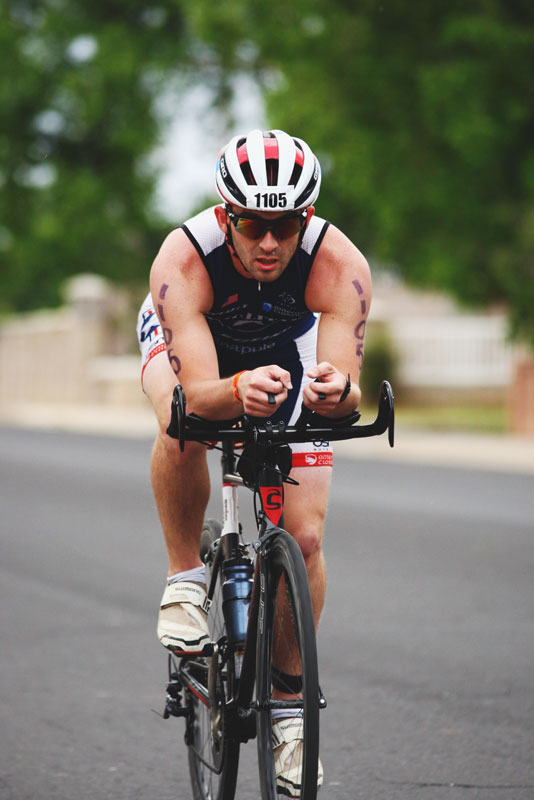
CT: What does the race entail?
MK: You start with a 2.4 mile swim, then go on a 112 mile bike, and finish by running a marathon. At this stage I’ve done 3 half Iron Mans, and I’ve done the full one once. I’m doing another full one in August. A half takes between 5 and 6 hours while a full takes between 11 and 12 hours.
CT: That’s such a long race. What’s it like to cross the finish line?
MK: For the half, I’m really really excited, then really really hungry. The full really drains my body. I’m really excited, then delirious. There’s a volunteer called a catcher who walks you around to make sure you’re okay and walks you from booth to booth to get everything. You have them for about 20 minutes and they make sure you’re okay.
CT: I’m sure everyone has their least favorite part of the race. What’s yours?
MK: I hate swimming, especially in open water. I hate it. Triathlon is a pretty aggressive sport. People are hitting and kicking you. Last time I got hit in the face and my goggles suctioned to my face so badly I got a black eye. When I’m out of the water, everything is much less chaotic.
CT: Why Iron Man?
MK: I don’t know. I’ve just always wanted to do one. I do a specialty type of heart rate training with lots of tracking and analytics. I really like the analysis and I like knowing how my body responds to particular types of training.
CT: Where do you go to compete?
MK: Iron Man is usually in bigger cities. It’s really wherever the sponsorships are. I was just in Utah. I’ll be in Raleigh soon, then in Idaho. I was in Austin, and Palm Beach.
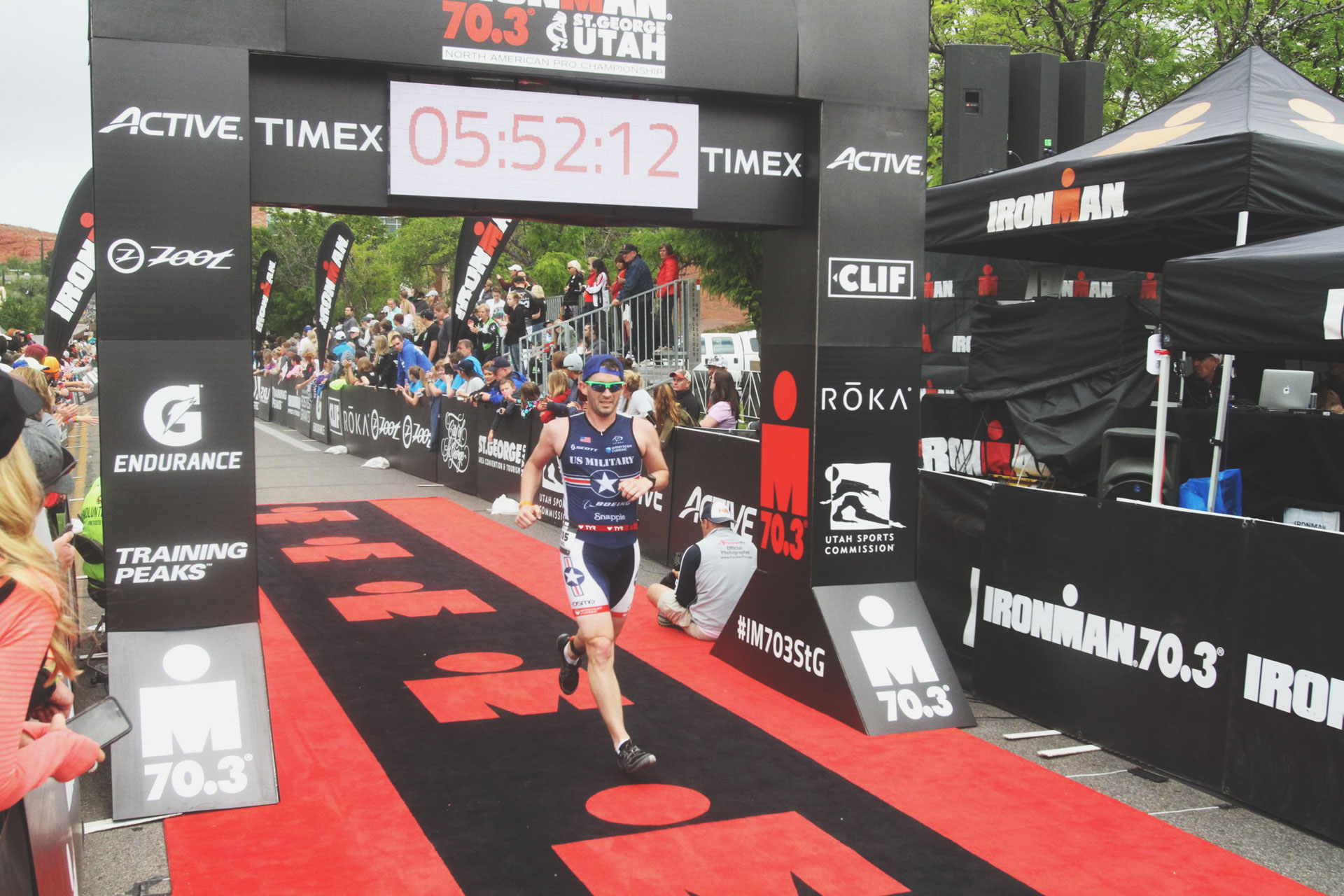
CT: Is there a community of Iron Man athletes? Are there lots of people, or is it small enough that you know everyone?
MK: Iron Man is really big, and it’s not the same people every year. You do see some familar faces. I’m usually with team Red, White, and Blue, or Military Endurance Sports. I see people that I’ve talked to at different races. It’s small, but not so small you know everyone.
CT: What’s your favorite Iron Man Experience?
MK: I did a half distance in December. I just had a really good race and run. I finished, and was waiting for another one of my friends when I looked up at the board. I finished second and qualified for nationals for my age group. I was just trying to have my best race. I didn’t intend to end up on the podium. I didn’t expect it. I knew I wouldn’t do that well at future races, and that thought didn’t bother me. It was cool to have that experience on that day. Sometimes when you finish you think, “That was way better than I ever could have done.” When I started I said I wanted to break the 6 hour mark. Now my trainer is talking about breaking 5 hours. These are the things I never would have said when I started.
CT: How has Iron Man affected life outside of Iron Man?
MK: It’s been really positive. I think a lot more about what I put in my body. I think a lot more about my actions. I plan a lot more. It used to be, “I might see you at church on Sunday if I wake up in time.” Now, I’m way more on top of my schedule. Last time my parents were in town they were wondering when I became this kind of person. My life is a lot more organized. It’s fun, too; people reach out to me and ask me to come run with them and ride with them. I get a lot more questions at work about helping with run and ride schedules. It’s created this little community. My roommate is doing the Iron Man with me this year. We have three or four other people who have done halfs and fulls who had never considered doing it before. It’s been fun to see interest in it spread. I didn’t start it. Someone roped me in. Now I’m reaching out to others.
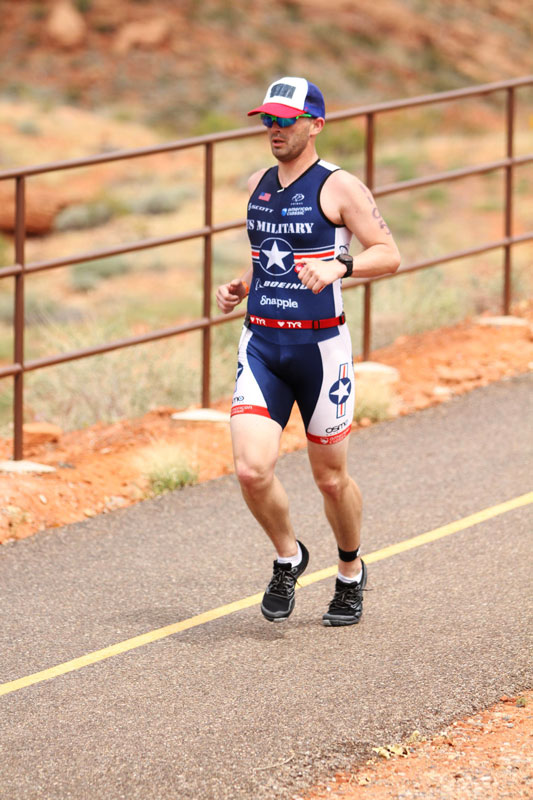
CT: What are your long term goals?
MK: I’d love to do a 5 hour half and an 11 hour full. I’d love to go to Cona, but realistically I’ll be 80 years old before I ever get there. I’d like to break 11 hours this year. Tom Elliott always talked to us about secondary goals when I was a coordinator at camp. If I don’t break 11, I’ll break 12. I find myself doing this all the time. I can hear his voice in my head.
CT: How do you talk about Iron Man with those who aren’t familiar?
MK: So many people think it’s unattainable. It’s like this unsurpassable wall. I had a friend who just did a half who didn’t know how to swim when she started. I get a lot of people who say, “I could never do that.” I encourage them to start with a sprint (500m swim, 10 mile bike, 5k). The big race becomes more attainable as you train. I knew this was something I wanted to do, and I did it. It’s been a long term goal of mine for a long time. I think that’s what scares people. People will just tell themselves, “I can’t do that.” Well sure you can, you just have to decide if it’s what you want. Dabble for awhile, then give it a try. The camaraderie in Iron Man is unmatched.
CT: How has your camp experience affected your Iron Man experience?
MK: I read a book about Iron Man a while back that talked about a group that meets up before the races. It’s a Christian Fellowship Group. Iron Man takes up a lot of your life, and it’s really easy to make it your life and only focus on Iron Man. This group meets to remind themselves that Iron Man isn’t a way of life. It can’t fill that void in your life. I remember that a lot. Even though Iron Man is fun and takes up a lot of my time, it can’t replace my relationship with God. That works its way into my plans. I remember to go to church, go to Young Life on Mondays. It helps make sure Iron Man doesn’t take over the things that are really important to me. That commitment to what’s important comes from my time at camp.

